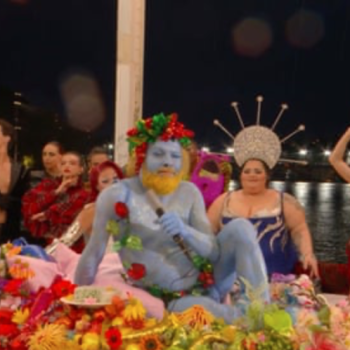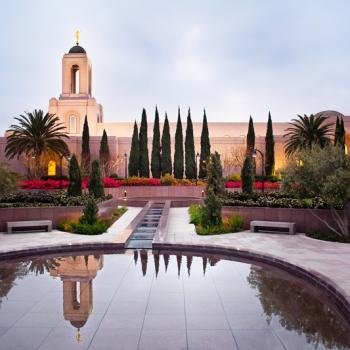There are worse things in life than having to go to Bordeaux for a conference, even if it is December and even if one doesn't drink wine. Worse even than munching on a ham and cornichon baguette sandwich at 11:00 a.m. because I skipped breakfast. Worse things than listening to Gary Clark, Jr., and watching the French countryside go by on the fast train back to Paris and then on to Provo.
Under the overcast winter sky the grays are grayer, the greens greener, and the tans and oranges of Bordelaise farms are more muted than in July or August. In spite of the season, there is a lot to enjoy: brown fallow rolling fields interspersed with green winter crops; trees filled with balls of mistletoe; villages, each with a church whose narrow spire is far too tall for the building to which it is attached. And—I swear it—I just saw a herd of kangaroos, ten or twelve of them jumping across a large field!
French kangaroos. Who'd have thought? Perhaps few of us, but obviously the farmer who's raising them had the idea. Probably others did too.
I'm embarrassed to say that for me the conference I'm returning from was a lot like French kangaroos. I knew that the conference's organizer, Bernadette Rigal-Cellard, is a reputable scholar of Mormonism. I know several of the other presenters and expected good things from them. I know that there is a strong though relatively small French LDS community, a number of whom have or are working toward doctoral degrees.
I know that French scholars are generally very thorough and careful. What I know of French philosophy taught me that long ago. I also know that the French have been interested in other cultures and religions for a long time. I've been reading about Eric de Rosny's experience and work in Cameroon, for example. But somehow I hadn't put such things together as I thought about this conference, so I was surprised to find not just a good but an excellent conference on Mormonism at the University of Bordeaux 3.
One of the surprises was how many French scholars, both professors and doctoral students, are working on themes having to do with Mormonism. Among them were several Mormons, but by no means were they all LDS.
The presenters were well-informed, at least as well-informed as similar presenters would have been at a comparable conference in the U.S. They know Mormon history, not just its 19th-century history, but also its 20th-century and contemporary history. They know the various ways that Mormons understand themselves. They know about the largest group, The Church of Jesus Christ of Latter-day Saints, headquartered in Salt Lake City, but also about smaller non-LDS groups, including the Community of Christ, the fundamentalist polygamous groups, and the Strangite Church of Jesus Christ of Latter-day Saints.
A pleasant surprise was that, unlike what one often finds in North American discussions, I saw few if any political agendas behind the presentations. No proselytizing or self-defense; no implicit political criticisms. Everyone seemed to stick to the facts. For me one of the most interesting and informative pieces was that of Jean Vilbas (University of Lille), Les questions LGBT en débat dans la tradition Mormon ; signe d'un alignement sur la Droite Religieuse Américaine ou indice d'un diversification religieuse? ("The LGBT Question in the Mormon Tradition: Sign of an Alignment with the Christian Right or of Religious Diversification?"). At an American conference I would expect such a presentation not only to give us the facts, but also to take a polemical stance.
But Professor Vilbas gave us an excellent overview of the history of LDS responses to LGBT issues and raised the question of the meaning of recent events without imposing a political answer to that question. He was what European scholars describe as "scientific" and what we in North America might call "objective."
There were excellent question-and-answer sessions at the end of each group of papers and, though the points of view were quite diverse, from believing Latter-day Saints, to former Latter-day Saints, to non-believers, there was no confrontation or ill-will in the discussions. The conference was a model of scholarly work and civility.
Also surprising was how many students attended each session. There were forty to fifty attendees at most events. Even the concluding session, which began about 5:00 p.m. Friday evening had twenty or thirty in the audience, evidence of more interest in the academic study of Mormonism than I would have predicted anywhere, much less in Bordeaux.





